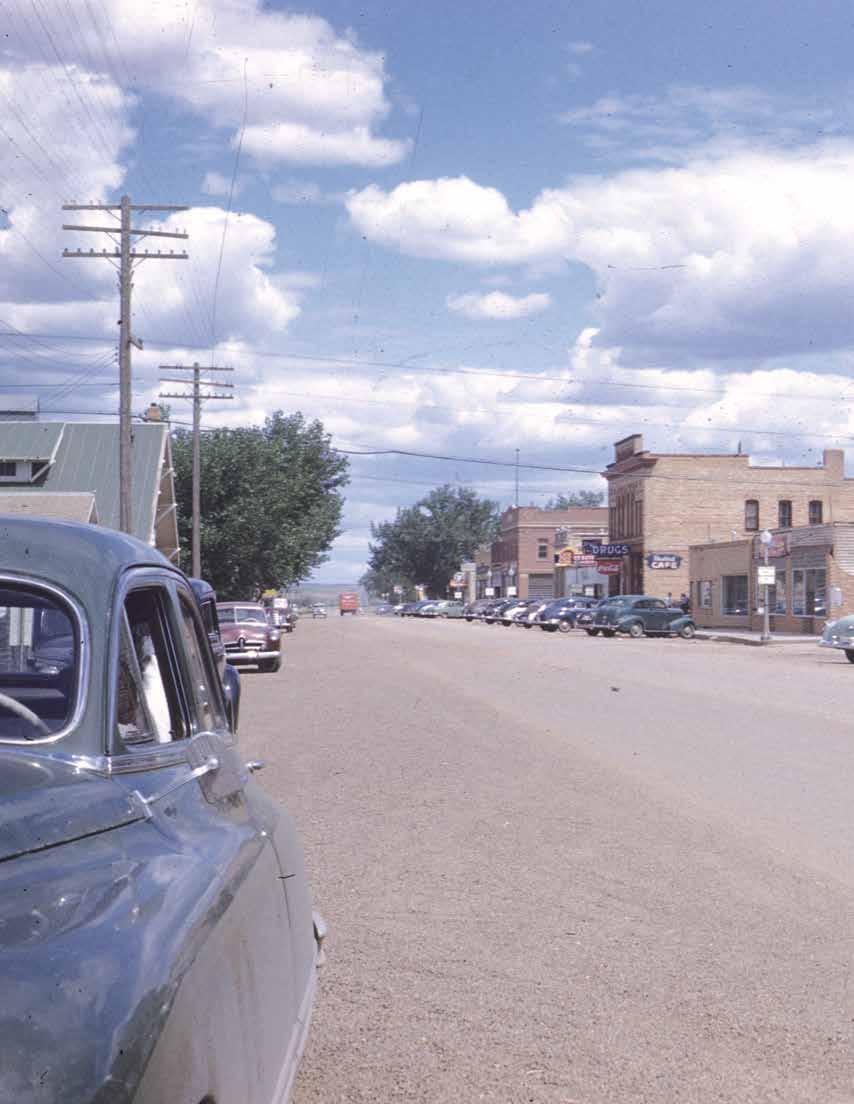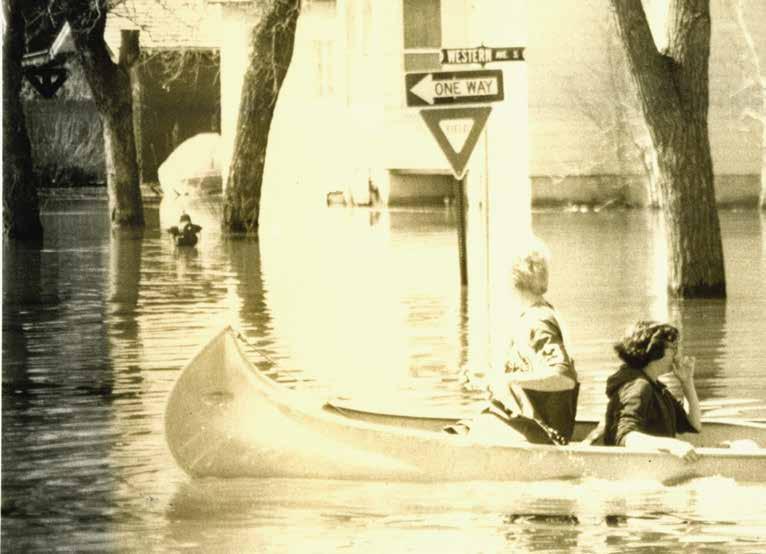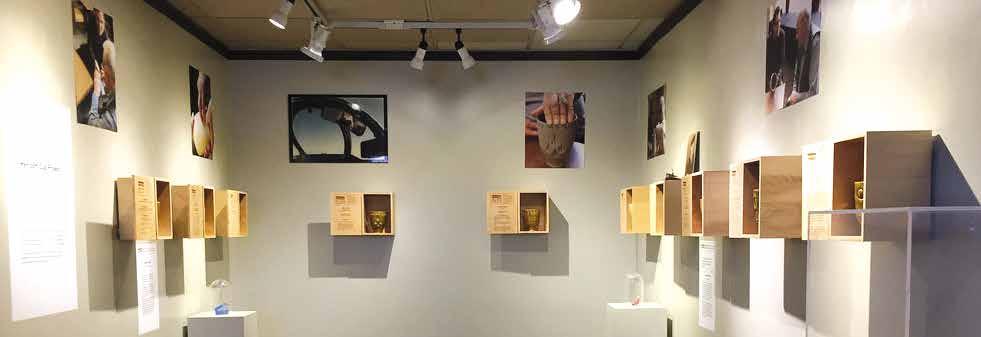
14 minute read
Bringing Big Vision to a Small Place: Isabel Flath
Bird’s-eye view of Stanley, 1909
By Richard Edwards
Advertisement
Eleven singers, including the three high school boys who made up the men’s section, stood in the choir loft of the little church. Isabel was putting them through their regular Wednesday-evening practice, and she treated rehearsal as something serious—you came on time, and you didn’t fool around. But she rarely criticized them, despite being an excellent and demanding musician herself, because she knew her singers’ limitations. At one point that evening someone whispered a side comment, the singers’ attentions wandered, and Isabel noted their distraction. Her face reddened and, forgetting that she was holding her pince-nez, she slammed her hand down on the balustrade, smashing her glasses. The choir was first shocked and then— quietly—amused, but mainly they felt bad because they had disappointed her. Isabel recovered her composure and continued the rehearsal, and she had to endure no more distractions that evening.
No one in Stanley felt good disappointing Isabel Flath. She was such an inspiring presence to most people in town, extending their horizons and raising their hopes, that she gave her community a depth and dimension often missing in small towns.
Stanley was a somewhat sleepy and dusty Dakota wheat town for most of its existence before the oil boom. Its 2010 population of 1,458 souls almost exactly matched its 1950 count of 1,486. I was among those causing the count to go down, having lived my first twelve years in Stanley but leaving when my parents moved away in1956. We took with us, however, memories of how we had benefited from Stanley’s most civic-minded and generous family. M.G. Flath, the town’s principal doctor from 1911 until well into the 1970s, was the family’s most prominent member, best known for delivering more than three thousand babies. Slightly less influential were Dr. Anton Flath, also a physician and sometimes county coroner, and Dr. G. Oakley Flath, one of two dentists in town. But perhaps the most remarkable of all the Flaths was Oakley’s wife, Isabel.
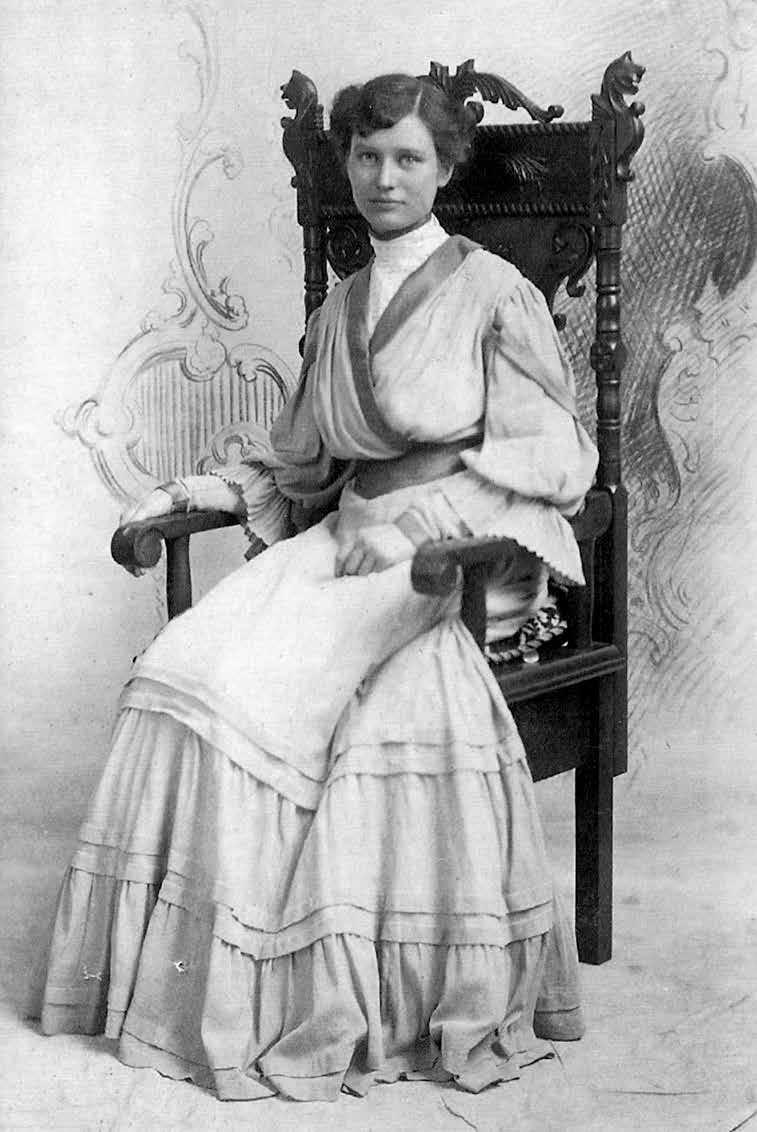
Isabel Proctor (Flath) at the time of her college graduation in 1910
I first got to know Isabel through our church. Built in 1928, Stanley’s graceful little Presbyterian church is admired as a gem of Tudor prairie architecture. Alas, architecture is not everything. On Sundays, while cars crowded the parking lots of Stanley’s Lutheran and Catholic churches and spilled out onto nearby streets, our church struggled to attract enough congregants to pay the minister and keep the roof repaired. One constant, though, was Isabel. She had an imposing presence, tall, with perfect posture and a naturally regal air. Her determination that we Presbyterians would have a spirited choir was an example of dauntless optimism so much admired by the town. Her attitude neither ignored reality—she knew the shortcomings of her talent pool—nor was of the Pollyannaish sort that seemed forced or inappropriate. She simply refused to permit obstacles to deflect her, believing she could achieve great things through determination, discipline, perseverance, and especially persistent optimism, and she held the same expectations for those of us around her.
Isabel was born in 1884 on a 120-acre farm near the settlement of Bailey in north-central Iowa. She and her family moved a few years later to the nearby town of Riceville. In 1906, at a time when few girls went to college, she followed her brother Warren to Iowa State Normal School, soon to become Iowa State Teachers College and now the University of Northern Iowa, in Cedar Falls.
Isabel led a wonderfully enriching and exciting college life. She played center on the girls’ basketball team, the Shakes. She participated in campus theatrical productions; in her junior year she portrayed Flora, Goddess of Flowers, in a production of M. Nataline Crumpton’s 1890 play Ceres. The following year she played one of the four court ladies in Hamlet; they “were all beautifully gowned and made a graceful picture,” according to the campus newspaper, the Normal Eyte. The review continued, “The year 1910 will long be remembered in our school for at least two events: The evolution into a college and the presentation by its students of the play of Hamlet.” Isabel also pursued a number of musical activities, including giving concerts with Warren. One Wednesday evening in March 1910, for example, the two of them performed in the nearby town of La Porte and returned to campus the next day. Isabel graduated that year with a bachelor’s degree in music and German.
It must have seemed to this adventurous, talented young woman that the whole world of art, music, and culture was open to her—but she needed to earn a living. In that era, even educated women faced a highly restricted choice of jobs, mostly teaching or nursing, and Isabel chose teaching. She landed her first job teaching music and English at Guttenberg, Iowa, and the following year she taught at Spring Valley, Minnesota.
Isabel’s life changed when her brother Mert, a railroad engineer who had settled in eastern Montana, wrote to her and suggested, “Come out and homestead. The government is giving land away.” Isabel found the prospect irresistible, and she and college friend Helen Craft took up adjacent claims fifteen miles from Rapelje, a remote community in the Stillwater County flatlands north of Yellowstone National Park. Homesteading rules required a claimant to live on the land for three years and make certain improvements, so Mert built a shack for them right on the boundary, half on Isabel’s claim and half on Helen’s, allowing them to live together and still fulfill the requirement. To earn their livelihoods, Isabel took a teaching job in the Rapelje school, while Helen landed a post in the opposite direction. Each needed to return every evening to maintain their required residence. For the commute they got two horses from their nearest neighbor, the Molt Ranch, and while Isabel was not an experienced horsewoman, but she was effusive in her praise for Preacher and Ginger. Less friendly were the rattlesnakes; Isabel carried a .45 and killed seven during her stay. After three years, they proved up on their homesteads; Isabel owned hers for the rest of her life.
She was now free to move on, and she sought a better teaching job. Stanley High School offered her a position, and in 1915 she arrived to teach music, geometry, girls’ physical education, and German, until it was banned during World War I. She also coached the girls’ basketball team. Irene (“Bird”) Edwards, my dad’s younger sister, was the star center on the team, once scoring twenty-two points in a 47–1 rout of Bowbells. For two years, Isabel’s team went undefeated, and in their 1917–1918 season they won the state championship in Minot, defeating Cooperstown 11–5. It was Stanley’s only state title for eightyone years until the 1999 Bluejays football team broke the string.
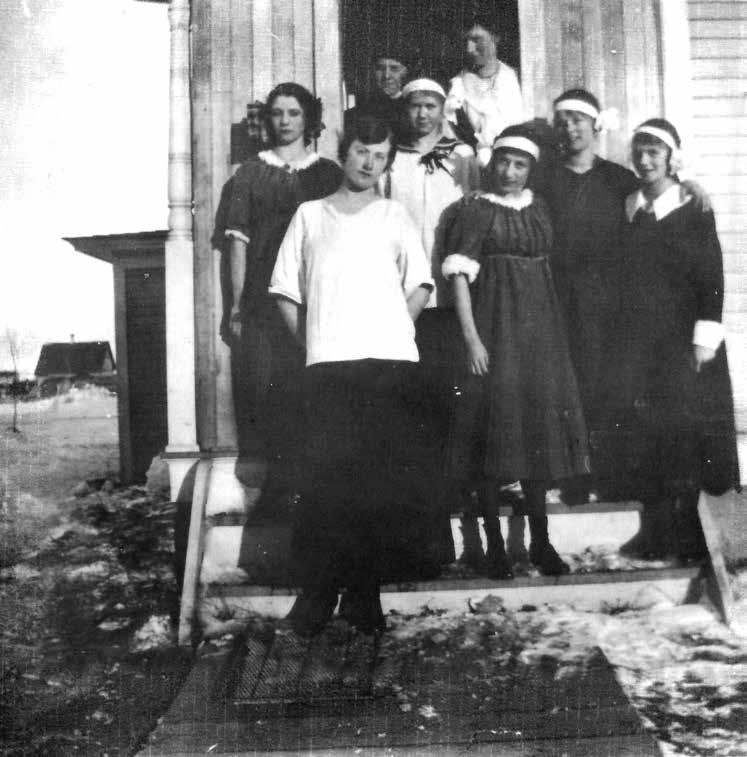
Stanley’s 1917-1918 championship girls’ basketball team, coached by Isabel Flath, top right. Courtesy of Warren Flath Collection.
Isabel’s life changed dramatically when she married G.O. Flath in December 1919 and moved in with the rest of the Flath clan in Anton’s busy house. Scuttlebutt around town was that Isabel had really wanted M.G. rather than Oakley, but she was determined to have a Flath. In her previous life, she had followed a kind of proto-feminist path, making her own decisions, playing sports, performing music and drama, working in a profession, and beginning to accumulate assets. As a married woman, however, she was expected to conform to the era’s expectations for a more constrained life. The first sign of her change in status was the loss of her American citizenship. The Iowa farm girl, native-born to a family whose ancestors had fought in the American Revolution, was stripped of her citizenship because Oakley came from Canada; married women assumed the citizenship of their husbands. Oakley became a U.S. citizen in 1920, and Isabel regained her citizenship after a ten-month lapse.
More permanent was the loss of her career, for schoolteachers were expected to quit their jobs when they married. Isabel found herself somewhat unexpectedly marooned in a small Dakota town without a profession, deprived of the music, drama, and other cultural pastimes that she enjoyed and excelled in. The young woman who had played in Hamlet was now stuck in a true hamlet, and the loss of opportunity and ambition must have seemed immense. One way or another, this was to be her future. How she viewed that future, what private doubts or demons she struggled with, she rarely showed.
In 1924 she traveled to Minneapolis to attend a concert on the world tour of internationally renowned Polish pianist, composer, and statesman Ignacy Jan Paderewski, a performance that thrilled her. It surely reminded her of the joys of her earlier life in music and drama, and she must have realized that whatever its other rewards, Stanley would never offer an opportunity for the full expression of her talents. Perhaps this was her watershed moment, for rather than lamenting her situation, Isabel was driven to act—she decided to foster the fullest expression of the talent in Stanley.
For the next six decades Isabel would be a force of nature in Stanley. To start, she organized a local MacDowell music club. She became the community’s major musical impresario, willing the town to have concerts and recitals, leading the church choir, and occasionally giving lessons, although her patience did have limits. She was adamant that all people, especially children, could make music. She was active in the Daughters of the American Revolution. With her erect bearing and cultured enunciation, her title of “Grand Worthy Matron” in Eastern Star, a Masonic auxiliary, seemed a natural appellation; she was a formidable but friendly presence whom few in town wanted to disappoint. And she had a profound impact on my family.
My own first encounter with Isabel—Mrs. Flath, to me—was in summer Bible camp when I was about ten. The church organized a half-day school for young children for a week each summer as a supplement to the hour-long Sunday school that we attended during the year. Isabel taught one part of it, which involved a competitive quiz. She would call out a question— Who was the Israelite king before David? What are the names of the four gospels?—and the twelve or fifteen of us kids sitting around the table would shoot up our hands if we knew the answer. I was first to answer nearly every one, putting me far in the point lead, because I had just finished reading Hurlbut’s Story of the Bible, which included short dramatizations and pictures of all the important Bible episodes. Answering was so easy that it almost felt like cheating. When Isabel asked, “Who was the innocent man upon whom God visited many terrible troubles?” My hand shot up and I answered immediately, “Job,” pronouncing it to rhyme with “Bob.” Mrs. Flath said nothing but looked a bit dismayed, and I could see I had disappointed her in some way. She corrected my pronunciation and awarded me the point, but such was her presence that I was so distraught at failing her I didn’t volunteer another answer all morning.
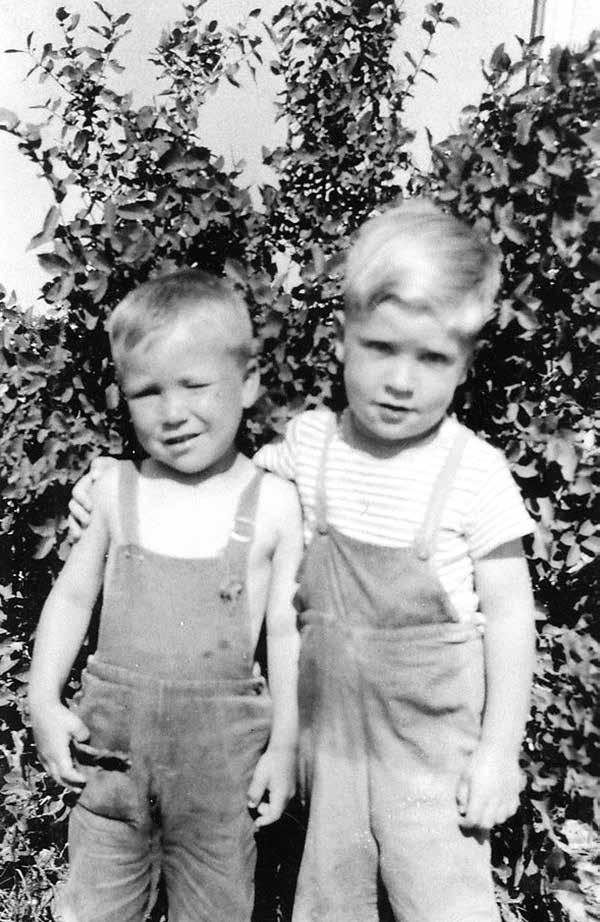
Richard Edwards and his childhood friend Jimmy in Stanley. Courtesy of Richard Edwards Collection.
To my sister Clarice, Isabel was “a shining ray in our town, because she was just different from the rest of us. She came with a bit of culture and a bit of something else the rest of us didn’t have. There were so many things that were eye-opening to us. How to have a lovely dinner. How to have a lovely concert. She was just filled with life, a real model for us.” Clarice first encountered Isabel when she was four and Isabel taught Sunday School. The half-dozen or so children sat on little red chairs in an airless room in the church basement, and Mrs. Flath narrated stories from the Bible in full dramatic form. Her innate urge to excel, even for this small audience, made the tales of Samuel or Jonah come alive for the kids. She led them in songs, the children belting out the words to please her. Eighty years later, Clarice could still recite:
Dare to be a Daniel,
Dare to stand alone.
Dare to have a purpose firm,
Dare to make it known!
The song’s lesson, imprinted so early, was one Clarice would carry with her throughout her life, especially fighting racism in northern Virginia.
My mother Winnie occasionally attended a club luncheon at Isabel’s house, but mainly she found Isabel’s self-assurance and decisiveness intimidating. Isabel did not participate in morning coffee, a custom of local women who gathered in shifting groups of two or three to socialize and exchange news before getting on with the rest of their day. Given the town’s strong Norwegian influence, “coffee” usually also meant fresh-baked cinnamon rolls, homemade doughnuts, or other sweets. Isabel refused to participate in this custom, presumably because she viewed it as a waste of time. Some saw her attitude as haughty, and it put them off, but to most, it just became part of her mystique. Isabel had instructed everyone in town, “Do not call between 1:00 and 2:00 p.m. That’s my time to rest.” She would go upstairs, take a nap, and take no calls. Such behavior was without precedent in Stanley; when the phone rang, we thought it impolite not to answer it. The grandeur of taking no calls amazed us. And whatever the truth to the gossip that she had initially wanted M.G., she obviously loved Oakley. She once told a teenaged Clarice, “Never to go bed without telling your husband you love him.”
For whatever reason, Isabel approved of the Edwards family and decided that Clarice was a suitable playmate for Warren, whom she and Oakley adopted when they were in their late thirties. When invited to the Flath house, Clarice would arrive at two or three in the afternoon, and she and Warren played, sometimes taking a game from a sunroom closet stuffed with all the latest board games. Once Isabel planned an outing for the four of them to see a movie in Minot, a musical with a shallow plot contrived only to feature the singing of Nelson Eddy and Jeanette MacDonald. It hardly ranked with the great Paderewski concert, but Eddy and MacDonald were a step up from the restricted cultural offerings of Stanley. Clarice marveled at the elegance of the trip, from dressing up to riding in the Flath’s luxurious car to the experience of the theater itself.
In high school, my sister Evelyn became Warren’s girlfriend, and she would sometimes be invited to dinner at the Flaths’. Isabel served an elegant meal, with nice table settings, good food, and lighted candles. After dinner, they would play bridge. All the Flaths, including Warren, were excellent bridge players. Evelyn was not; in our house, we played canasta, a distinctly more plebian game. Although Evelyn knew the rules of bridge, she was at sea when one of the Flaths, having bid six hearts, would lay down the cards after the first trick and say, “Okay, I have the rest of them.” Evelyn thought, “How could that be, when I’m holding an ace?” They were right, of course, but they never criticized her play, even when she made a bad bid or a foolish lead. Later, after she became an excellent player herself, Evelyn realized that those evenings must have been tedious for the Flaths.
Isabel, like the other Flaths in their different ways, lived a life of self-sacrificing service to the people who lived around her; without a whiff of self-promotion, her unflagging and dauntless optimism inspired others. She dared to be a Daniel. We noticed this trait directly, because her attitude seemed to say, “Those Edwards children look to be alright; I’ll shape them into something.” Patronizing as it sounds, we were grateful for her tutelage. Our parents, indifferently educated themselves, revered learning and saw Isabel’s efforts as opportunities for us and for the whole community. “Isabel was a person who changes your life,” Clarice remembered, “always wanting you to reach for bigger things, believing there was another life outside the everyday life of Stanley. In fact many years later I wrote her a letter expressing my admiration and gratitude to her and remembering that little song we sang, because it’s a good enough philosophy of life in four lines [and] you don’t need anything else. But I never sent it, which I regret.”
RICHARD EDWARDS grew up in Stanley, North Dakota. He is currently the director of the Center for Great Plains Studies at the University of Nebraska-Lincoln. Edwards received his PhD in economics from Harvard University.
This article is adapted from chapter six of Natives of a Dry Place: Stories of Dakota before the Oil Boom, © 2015 by the South Dakota Historical Society Press. The article or portions thereof in any form whatsoever may not be reproduced without the expressed written approval of the




